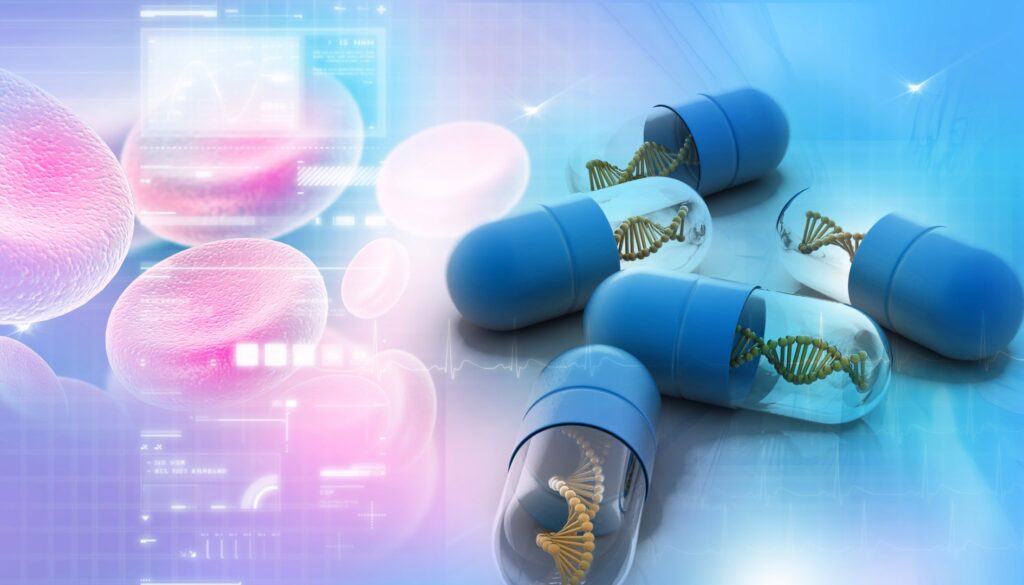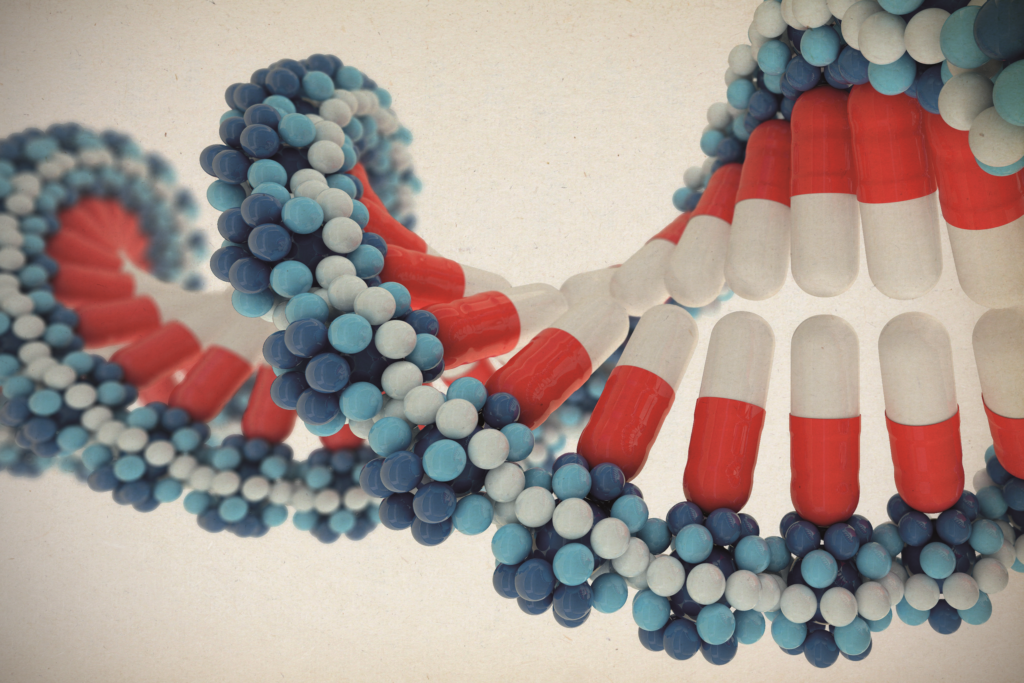Pharmacogenomics is the study of how genes affect a person’s response to drugs, is a critical component of the movement towards personalised medicine. This burgeoning field promises to forge a new frontier in healthcare by tailoring drug therapy at a genetic level, ensuring maximum efficacy and minimal side effects. As we stand on the cusp of a healthcare revolution, Artificial Intelligence (AI) emerges as a pivotal force driving the integration of pharmacogenomics into clinical practice.
In psychiatric disorders, pharmacogenomics has the potential to revolutionise treatment outcomes by optimising drug selection, dosing, and monitoring based on individual genetic profiles. Genetic variations in drug metabolism and response pathways can significantly impact the efficacy and safety of psychiatric medications, making pharmacogenomic testing a valuable tool for clinicians.
Pharmacogenomic testing involves the analysis of genetic variants that impact drug metabolism and response. These tests can identify patients who are poor, intermediate, normal, rapid, or ultrarapid metabolizers of specific drugs, providing crucial information for personalised medication management.
Despite the promising potential of pharmacogenomics and AI in psychiatric disorders and oncology, challenges remain. These include the need for more extensive clinical validation, standardisation of testing and reporting, and the integration of pharmacogenomic data into electronic health records.
What is the relationship between Pharmacogenomics and Psychiatric disorders ?
Pharmacogenomics is a rapidly evolving field that has the potential to revolutionise the way we approach psychiatric disorders and their treatment. By studying the genetic variations that can influence an individual’s response to drugs, pharmacogenomics can inform and predict an individual’s response to psychiatric medications, leading to more personalised and effective treatment approaches.
In psychiatry, pharmacogenomics has the potential to address the significant challenges faced by prescribing clinicians in selecting safe and effective treatment options tailored to individual patients. Many patients undergo a trial-and-error process characterised by poorly controlled symptoms and/or severe drug side effects. Pharmacogenomic testing, such as single nucleotide polymorphisms (SNPs) to measure treatment response and potential adverse drug reactions, can help individualised treatment plans and pave the way to more individually tailored approaches.
The cytochrome P450 (CYP450) enzymes are a crucial focus in pharmacogenomics, as they are responsible for the metabolism and CNS bioavailability of more than 50% of medications currently in clinical use. Variations in these enzymes can significantly impact the metabolism of psychotropic medications, leading to differences in treatment response and adverse effects among different populations.
In addition to CYP450 enzymes, the HLA gene variation has been shown to predict the potential adverse effects of psychotropic medications. Genetic susceptibility to obesity and metabolic syndrome, which are recognized adverse effects of several psychotropic medications, especially second-generation antipsychotics, is also an important consideration in pharmacogenomics.
Pharmacogenomics is a promising approach to improving the treatment of psychiatric disorders, but its wide adoption in clinical practice has not yet occurred. Factors such as varying knowledge of genetics among psychiatrists, differing opinions on the efficacy of pharmacogenomic testing, and conflicting perceptions of the PGx tool evidence-base may contribute to this delay. However, as our understanding of pharmacogenomics in psychiatry continues to advance, it is likely that its use in clinical practice will become more widespread, leading to more personalised and effective treatment approaches for patients with psychiatric disorders.
What are some challenges in implementing pharmacogenomics in psychiatric treatment ?
Operational definition: Implementing pharmacogenomics in psychiatric treatment faces several challenges. One major challenge is the need for operational definitions that capture the multi-dimensional nature of psychiatric disorders and their treatment response[3]. Psychiatric disorders are complex and multifactorial, involving genetic, environmental, and psychosocial factors. Identifying specific genes that influence the absorption, distribution, metabolism, and excretion (ADME) of medications is a crucial first step, but it is only part of the picture.
Knowledge availability limitation: Another challenge is the need for more extensive clinical validation and standardisation of testing and reporting. While the evidence for pharmacogenomics in psychiatry has matured to a level where guidelines for implementation have emerged, there is still a need for more extensive clinical validation to ensure the accuracy and reliability of pharmacogenomic testing[1]. Additionally, standardisation of testing and reporting is essential to ensure that healthcare providers can interpret and apply pharmacogenomic test results in a consistent and meaningful way.
Incorporating pharmacogenomics into current workflow and a lack of knowledge about PGx are also common barriers to implementation[2]. Healthcare providers may be unfamiliar with pharmacogenomics and its potential applications in psychiatric treatment. Additionally, integrating pharmacogenomic testing into existing workflows can be challenging, requiring changes to clinical protocols, electronic health records, and other systems.
Cost of implementation: Cost is another significant barrier to implementation. Pharmacogenomic testing can be expensive, and healthcare systems may be reluctant to invest in new technologies without clear evidence of their cost-effectiveness. However, studies have shown that pharmacogenomic testing can reduce healthcare costs by reducing trial and error, improving treatment outcomes, and reducing adverse drug reactions.
Legal and ethical issues: Finally, there is a need for more research on the ethical, legal, and social implications of pharmacogenomics in psychiatric treatment. Issues such as genetic privacy, informed consent, and the potential for discrimination based on genetic information need to be carefully considered and addressed.
Conclusion :
Pharmacogenomics holds promise for revolutionizing psychiatric treatment by personalizing drug therapy based on genetic profiles. Understanding how genetic variations influence drug metabolism enables clinicians to optimize treatment selection and dosing, improving patient outcomes. However, challenges include operationalizing complex psychiatric disorders, validating clinical findings, and standardizing testing. Healthcare providers need education on pharmacogenomics, and workflows must integrate testing seamlessly. Cost and ethical considerations also require attention. Despite challenges, pharmacogenomics offers significant potential for enhancing psychiatric care. As research progresses and evidence accumulates, it can play a crucial role in personalized medicine, offering more effective treatment approaches for mental illness. With concerted efforts to address implementation barriers, pharmacogenomics stands to transform psychiatric treatment and improve the quality of care for individuals with mental health conditions.
Citations:
[2] https://www.frontiersin.org/journals/pharmacology/articles/10.3389/fphar.2020.575540/full
[3] https://www.psychiatrictimes.com/view/psychiatric-pharmacogenomics-the-evidence-base
[4] https://www.linkedin.com/pulse/pharmacogenomics-ai-way-ahead-rameez-choudhari-gmtkf
[5] https://www.ons.org/cjon/27/2/pharmacogenomic-germline-testing-applications-oncology-nursing
[6] https://www.ncbi.nlm.nih.gov/pmc/articles/PMC9655367/
[7] https://www.sciencedirect.com/science/article/pii/S0896627321006838
[8] https://www.ncbi.nlm.nih.gov/pmc/articles/PMC7518035/




